A CRM Manager plays a key role in managing and optimizing customer relationships. They ensure that the CRM system is effectively utilized to enhance customer satisfaction and drive business growth.
CRM Manager skills include proficiency in CRM software, data analysis, and project management, along with strong communication and problem-solving abilities.
Candidates can write these abilities in their resumes, but you can’t verify them without on-the-job CRM Manager skill tests.
In this post, we will explore 9 essential CRM Manager skills, 11 secondary skills and how to assess them so you can make informed hiring decisions.
Table of contents
9 fundamental CRM Manager skills and traits
The best skills for CRM Managers include Data Analysis, CRM Software Proficiency, Customer Segmentation, Campaign Management, Data Privacy Compliance, Reporting and Analytics, Integration Skills, Problem-Solving and Communication Skills.
Let’s dive into the details by examining the 9 essential skills of a CRM Manager.
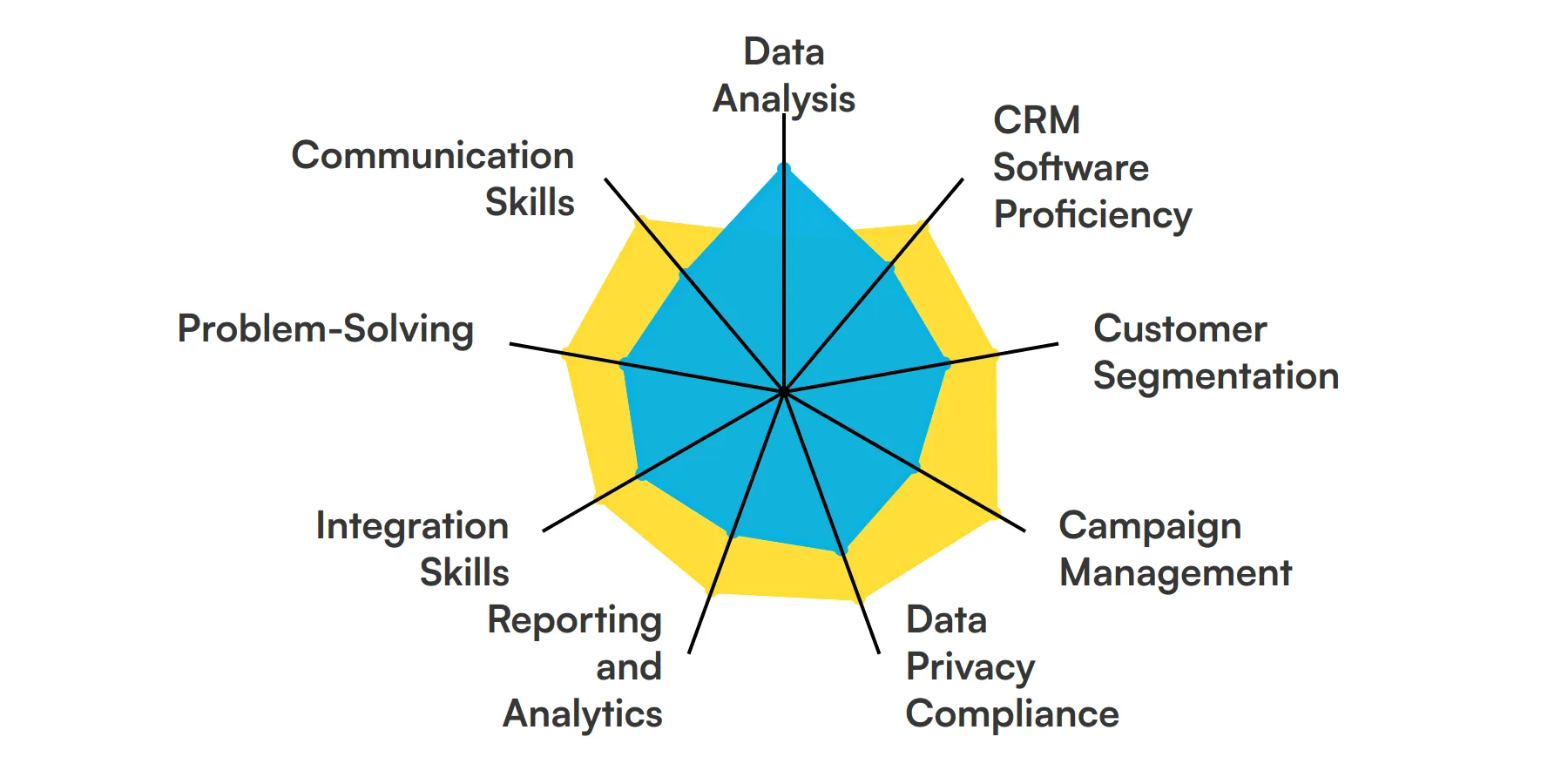
Data Analysis
A CRM Manager needs to be adept at data analysis to interpret customer data and derive actionable insights. This skill helps in understanding customer behavior, preferences, and trends, which is crucial for making informed decisions and optimizing CRM strategies.
For more insights, check out our guide to writing a Data Analyst Job Description.
CRM Software Proficiency
Proficiency in CRM software like Salesforce, HubSpot, or Zoho is a must. A CRM Manager uses these tools to manage customer relationships, track interactions, and automate processes, ensuring a seamless customer experience.
Customer Segmentation
Understanding how to segment customers based on various criteria such as demographics, behavior, and purchase history is key. This skill allows a CRM Manager to tailor marketing efforts and communication strategies to different customer groups effectively.
Campaign Management
A CRM Manager must be skilled in planning, executing, and monitoring marketing campaigns. This involves coordinating with different teams, setting up workflows, and analyzing campaign performance to drive customer engagement and retention.
Check out our guide for a comprehensive list of interview questions.
Data Privacy Compliance
Knowledge of data privacy laws and regulations like GDPR is essential. A CRM Manager ensures that all customer data is handled in compliance with these laws, protecting the company from legal issues and maintaining customer trust.
Reporting and Analytics
Creating detailed reports and analytics dashboards is a critical skill. A CRM Manager uses these reports to track key performance indicators (KPIs), measure the success of CRM initiatives, and provide insights to stakeholders.
Integration Skills
The ability to integrate CRM systems with other business tools and platforms is important. This ensures that data flows seamlessly across the organization, providing a unified view of customer interactions and enhancing overall efficiency.
Problem-Solving
A CRM Manager often encounters challenges that require quick and effective solutions. Problem-solving skills help in addressing issues related to customer data, system performance, and campaign effectiveness, ensuring smooth operations.
Communication Skills
Strong communication skills are necessary for a CRM Manager to collaborate with different teams, present findings, and convey strategies. Clear communication ensures that everyone is aligned and working towards common goals.
For more insights, check out our guide to writing a Communications Manager Job Description.
11 secondary CRM Manager skills and traits
The best skills for CRM Managers include Project Management, Technical Aptitude, Customer Journey Mapping, Email Marketing, Social Media Integration, Content Management, Sales Process Knowledge, Customer Feedback Analysis, Budget Management, Training and Support and Market Research.
Let’s dive into the details by examining the 11 secondary skills of a CRM Manager.
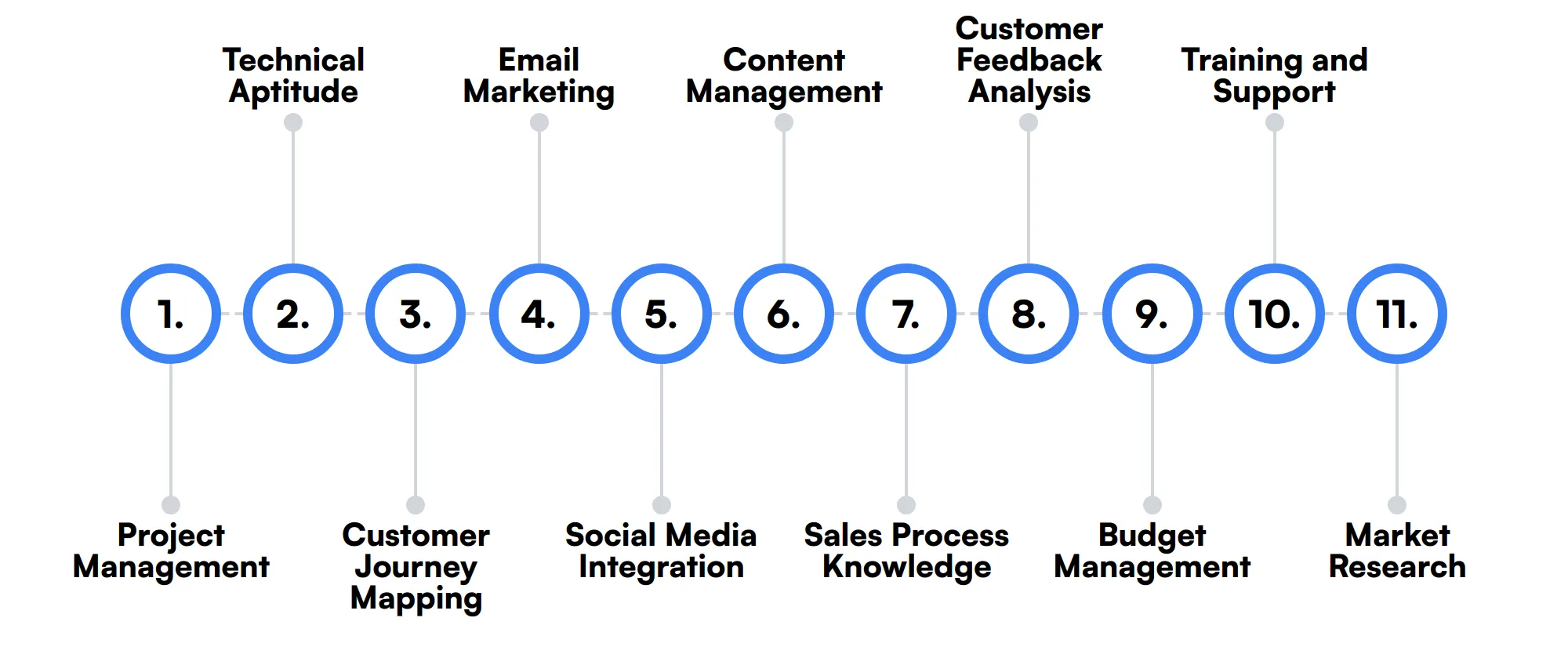
Project Management
Managing multiple CRM projects simultaneously requires good project management skills. This includes setting timelines, allocating resources, and ensuring that projects are completed on schedule.
Technical Aptitude
A basic understanding of technical aspects like APIs, databases, and software development can be beneficial. This helps a CRM Manager in troubleshooting issues and working effectively with IT teams.
Customer Journey Mapping
Mapping out the customer journey helps in identifying touchpoints and improving the overall customer experience. This skill allows a CRM Manager to create more personalized and effective customer interactions.
Email Marketing
Knowledge of email marketing strategies and tools is useful for a CRM Manager. This includes creating email campaigns, segmenting email lists, and analyzing email performance to drive customer engagement.
Social Media Integration
Integrating CRM with social media platforms can enhance customer engagement. A CRM Manager should understand how to leverage social media data and interactions to improve customer relationships.
Content Management
Managing and curating content that resonates with customers is important. This skill helps a CRM Manager in creating relevant and engaging content that supports marketing and customer retention efforts.
Sales Process Knowledge
Understanding the sales process and how CRM supports sales activities is beneficial. This knowledge helps in aligning CRM strategies with sales goals and improving overall sales performance.
Customer Feedback Analysis
Analyzing customer feedback helps in identifying areas for improvement. A CRM Manager uses this feedback to refine strategies and enhance the customer experience.
Budget Management
Managing budgets for CRM initiatives ensures that resources are allocated effectively. This skill helps a CRM Manager in planning and executing cost-effective strategies.
Training and Support
Providing training and support to team members on CRM tools and processes is important. This ensures that everyone is proficient in using the CRM system and can contribute to its success.
Market Research
Conducting market research helps in understanding industry trends and customer needs. A CRM Manager uses this information to stay ahead of the competition and tailor strategies accordingly.
How to assess CRM Manager skills and traits
Assessing the skills and traits of a CRM Manager is a nuanced process that requires a deep understanding of the role's demands and the specific skills required.
While a resume might highlight a candidate's experience with CRM software or their proficiency in data analysis, it doesn't provide a clear picture of their practical abilities or how they apply their skills in real-world scenarios. This is where skill assessments come into play, offering a more dynamic and accurate measure of a candidate's capabilities.
For instance, evaluating a CRM Manager's skills in areas like customer segmentation, campaign management, and data privacy compliance requires more than just a cursory glance at their previous job titles. It involves understanding how they analyze data, strategize campaigns, and ensure compliance with relevant laws—all of which are critical for the role. By using targeted assessments, such as those offered by Adaface, you can measure these competencies effectively. Adaface assessments are designed to mirror actual job tasks, helping you achieve a 2x improvement in the quality of your hires.
Let’s look at how to assess CRM Manager skills with these 6 talent assessments.
Data Analysis Test
Our Data Analysis Test assesses a candidate's ability to handle, modify, analyze, and interpret data. The test uses scenario-based MCQ questions to screen for experience with analyzing data to find possible outcomes, detect anomalies, extract meaningful insights, project estimates, and visualize data using charts and graphs.
The test evaluates skills in data modeling, business analysis, data interpretation, and SQL. Candidates will navigate through realistic scenarios involving data queries and databases, requiring them to perform aggregations, statistics, and data operations like predictions and anomaly detection.
Successful candidates demonstrate proficiency in popular data tools like Excel and show a strong ability to interpret data through charts and graphs. They also exhibit a solid understanding of data investigations, including correlations and ranking.

Microsoft Dynamics 365 Customer Service Functional Consultant Test
The Microsoft Dynamics 365 Customer Service Functional Consultant Test uses scenario-based multiple-choice questions to evaluate candidates on their proficiency in various customer service functions using the Dynamics 365 platform.
The test assesses knowledge in customer service configuration, case management, entitlements, SLAs, knowledge management, and omnichannel engagement. Candidates are evaluated on their ability to design and implement customer service solutions using the Dynamics 365 platform.
High-scoring candidates show a deep understanding of Dynamics 365 functionalities and demonstrate the ability to effectively manage customer service operations, ensuring seamless omnichannel engagement and adherence to service level agreements.
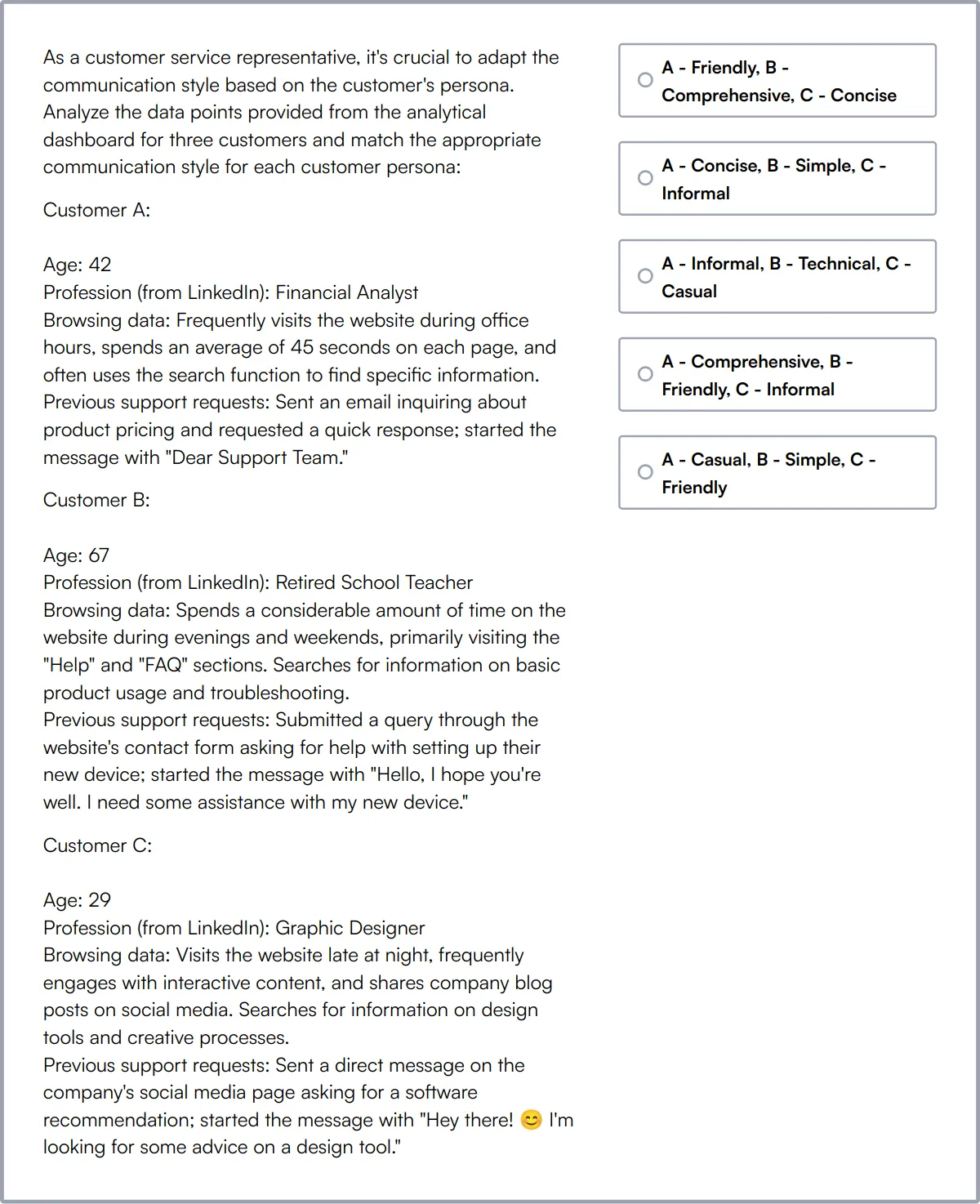
Marketing Analysis Test
The Marketing Analysis Test evaluates a candidate's knowledge in marketing analysis, digital marketing, Google Ads, PPC advertising, marketing aptitude, SEO assessment, Google Analytics, content strategy, copywriting, and data analysis.
The test covers marketing principles, market trends analysis, and consumer behavior. Candidates are assessed on their ability to analyze marketing data, develop effective content strategies, and optimize digital marketing campaigns using tools like Google Analytics and Google Ads.
Candidates who perform well demonstrate strong analytical skills and a comprehensive understanding of digital marketing strategies, including SEO and PPC advertising. They also show proficiency in creating and executing content strategies that drive engagement and conversions.
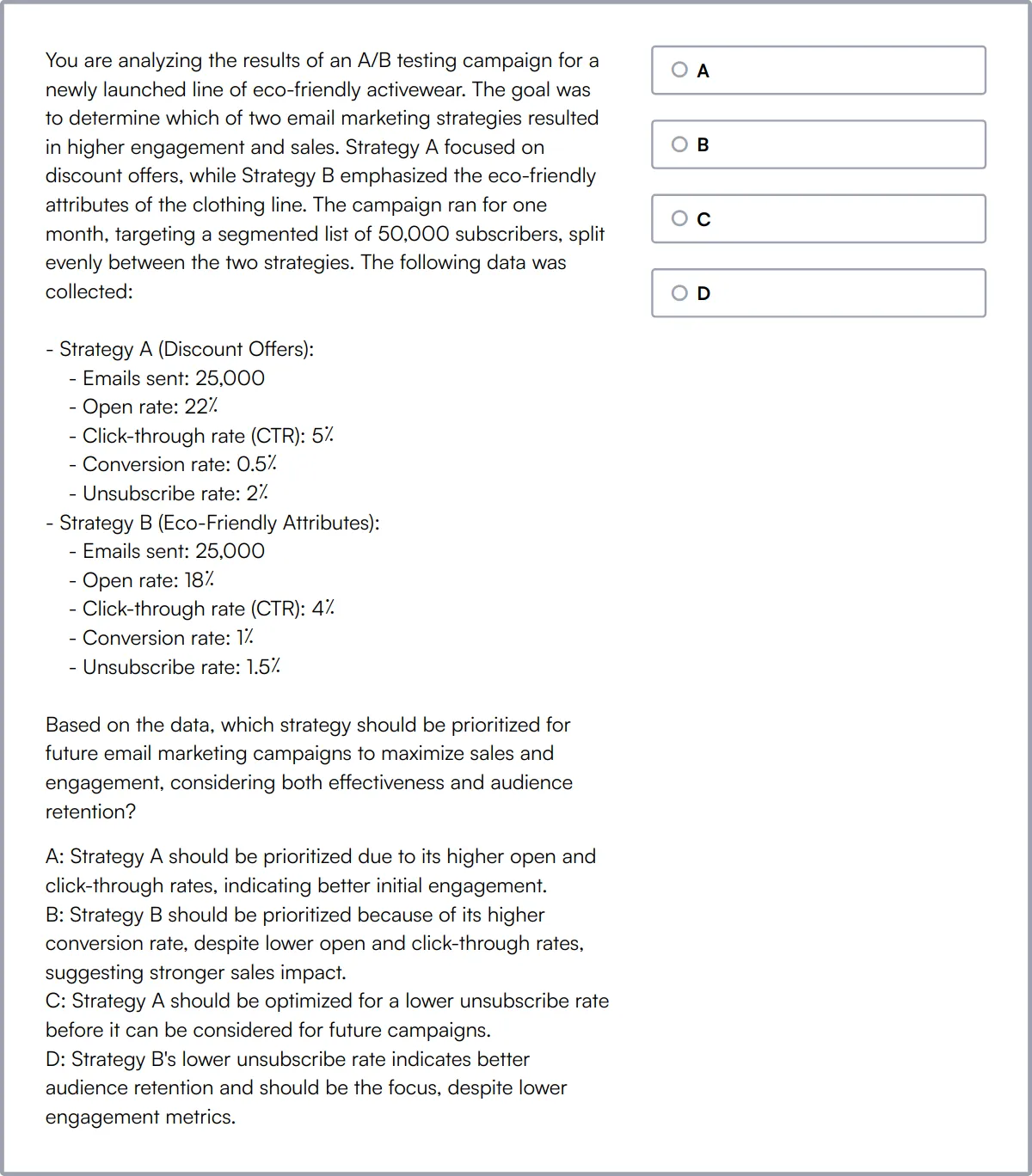
Digital Marketing Test
The Digital Marketing Test evaluates a candidate's ability in SEO, inbound marketing, email marketing, distribution channels, paid ads, analytics, and end-user insight using real-life scenario-based questions.
The test assesses skills in social media marketing, search engine optimization, search engine marketing, ecommerce marketing, Google paid ads, Google Analytics, email marketing, mobile marketing, ad servers, and social media analytics.
Candidates who excel in this test demonstrate a strong understanding of digital marketing channels and tools, including the ability to analyze and optimize campaigns for better performance. They also show proficiency in leveraging data insights to drive marketing strategies.
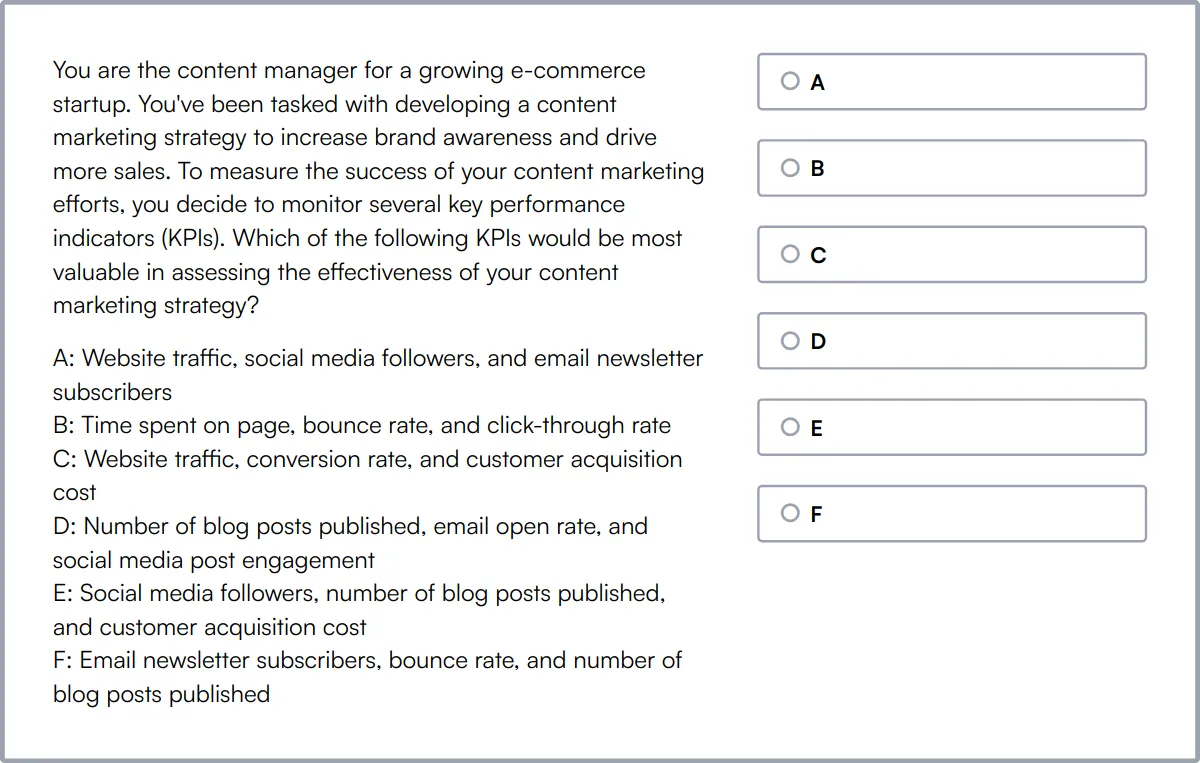
GDPR Online Test
The GDPR Online Test uses scenario-based MCQs to evaluate candidates on their understanding of GDPR regulations and best practices for data protection and privacy.
The test covers data privacy, data protection, data security, data breach, data processing, consent management, data retention, data subject rights, data transfer, data controllers, and data processors. Candidates are assessed on their ability to identify and evaluate data protection risks and develop GDPR compliance policies.
High-scoring candidates demonstrate a thorough understanding of GDPR requirements and the ability to implement effective data protection measures. They also show proficiency in managing data subject rights and ensuring compliance with data transfer regulations.
Business Intelligence Analyst Test
The Business Intelligence Analyst Test evaluates a candidate's knowledge and skills in areas such as business intelligence, data analysis, data visualization, SQL, data modeling, data warehousing, and dashboard creation.
The test assesses skills in business intelligence, data analysis, data visualization, SQL, data modeling, and analytical thinking. Candidates are required to interpret data, create visualizations, and develop data models to support business decision-making.
Successful candidates demonstrate strong analytical thinking and proficiency in using tools like Excel and SQL for data analysis and visualization. They also show the ability to create effective dashboards and data models that provide valuable business insights.
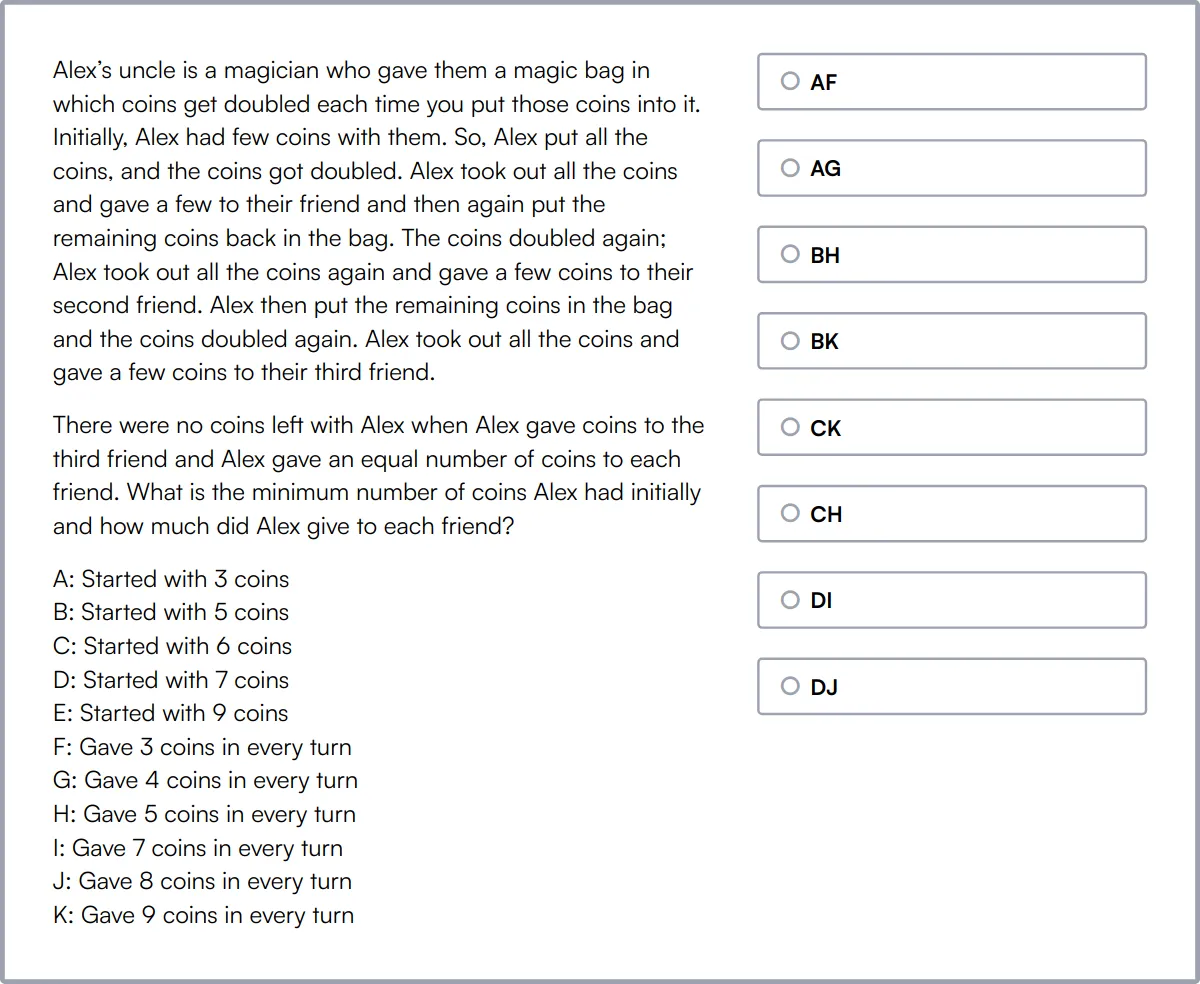
Summary: The 9 key CRM Manager skills and how to test for them
| CRM Manager skill | How to assess them |
|---|---|
| 1. Data Analysis | Evaluate candidate's ability to interpret and derive insights from data. |
| 2. CRM Software Proficiency | Assess familiarity and expertise with CRM software tools and features. |
| 3. Customer Segmentation | Check ability to categorize customers based on specific criteria effectively. |
| 4. Campaign Management | Review experience in planning, executing, and monitoring marketing campaigns. |
| 5. Data Privacy Compliance | Verify knowledge of and compliance with data protection regulations. |
| 6. Reporting and Analytics | Assess skills in creating detailed reports and performing analytics. |
| 7. Integration Skills | Evaluate ability to integrate and synchronize multiple systems and tools. |
| 8. Problem-Solving | Test problem-solving skills through real-life scenarios or case studies. |
| 9. Communication Skills | Judge clarity, effectiveness, and adaptability in communication. |
Office Manager Test
CRM Manager skills FAQs
What are the key skills required for a CRM Manager?
A CRM Manager should have skills in data analysis, CRM software proficiency, customer segmentation, campaign management, and data privacy compliance.
How can recruiters assess a candidate's data analysis skills?
Recruiters can assess data analysis skills by reviewing past projects, asking for case studies, or conducting a practical test involving data interpretation.
Why is CRM software proficiency important for a CRM Manager?
CRM software proficiency is important because it ensures the manager can effectively use tools to manage customer relationships, track interactions, and analyze data.
What methods can be used to evaluate a candidate's campaign management skills?
Evaluate campaign management skills by discussing past campaigns, reviewing metrics of success, and asking situational questions about campaign strategy.
How do you assess a candidate's knowledge of data privacy compliance?
Assess data privacy compliance knowledge by asking about relevant regulations (e.g., GDPR), and discussing how they have implemented compliance measures in past roles.
What is the importance of customer journey mapping in a CRM Manager role?
Customer journey mapping helps CRM Managers understand and improve the customer experience by visualizing the entire customer lifecycle and identifying pain points.
How can communication skills be evaluated during the hiring process?
Communication skills can be evaluated through interviews, role-playing scenarios, and by asking for examples of how the candidate has effectively communicated in past roles.
What role does market research play in a CRM Manager's responsibilities?
Market research helps CRM Managers understand customer needs, preferences, and trends, enabling them to tailor strategies and improve customer satisfaction.

40 min skill tests.
No trick questions.
Accurate shortlisting.
We make it easy for you to find the best candidates in your pipeline with a 40 min skills test.
Try for freeRelated posts
Free resources



